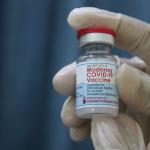Since the beginning of the pandemic, many commentators have identified the elderly as the group most vulnerable to COVID-19.
CDC
Do children under five years old need COVID-19 vaccines? Answering that question should be a simple matter of comparing the risk of infection to the risks and benefits of vaccination in this age group.
Research going back many years has shown that vaccine mandates tend to backfire. Forcing people to get shots they don't want often exacerbates their skepticism.
Years from now, healthcare professionals, economists, public health officials, and policymakers will evaluate the true impact of the COVID-19 pandemic on the U.S. and the world.
Vaccine skepticism comes in many different varieties.
Since January, billions of COVID-19 vaccines have been administered around the world.
Throughout the pandemic, we've watched the media follow a predictable formula in their COVID-19 reporting.
“Adults can do what they want, even though there’s simply no evidence that vapes help them to quit smoking. But our kids are not for sale.
Why are so many Americans unwilling to get a COVID-19 vaccine?
Study after study (after












